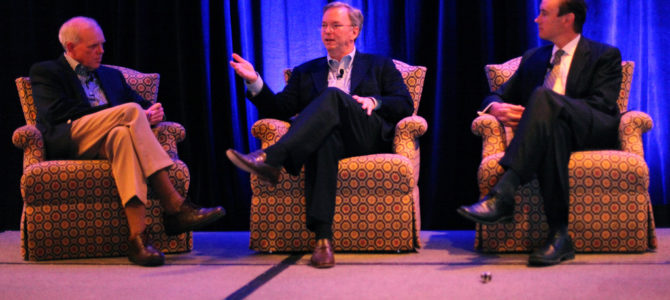
Google’s recent firing of employee James Damore, who criticized the company’s understanding of “diversity,” triggered predictable reactions across the political spectrum, with progressives applauding the decision and conservatives condemning it.
The question of what constitutes diversity and whether Google’s actions represent a defense of diversity—or an attack against it—is an important debate to have. But putting the spotlight on Google’s values reveals something potentially more troubling: the fact that the company associates its moral point of view with “scientific thinking.”
Mission Statements in Test Tubes
Eric Schmidt, the chairman of Google’s parent company, Alphabet, recently told a group of shareholders, “The company was founded under the principles of freedom of expression, diversity, inclusiveness, and science-based thinking. You’ll also find that all of the other companies in our industry agree with us.”
This may sound like a reasonable, even innocuous, thing to say. Who wants to claim that their company is against freedom of expression, or diversity, or inclusiveness, or science-based thinking? Indeed, many believe that Google’s firing of Damore was justified entirely on scientific grounds because he advanced, in their view, “bad science” (though others think the science wasn’t so bad).
But Schmidt’s statement doesn’t only pertain to what distinguishes “good science” from “bad science”. It also raises the question of what “science” has to do with definitions of morality. Freedom of expression, diversity, and inclusiveness are moral values. They are answers to the question, “What is good?”
“Scientific thinking”, on the other hand, is a method. It is an answer to the question, “How do we know?” What Schmidt’s statement is doing, in other words, is conflating two different realms of inquiry—epistemology and ethics—as if the former automatically authorizes the latter.
But it doesn’t.
Can I Get a Witness, Francis Bacon?
Consider Alphabet’s corporate motto (which replaced Google’s former motto, “Don’t be Evil”): “Do the Right Thing”. How might this umbrella value—the value that encompasses the subordinate values of free expression, inclusion, and diversity—relate to scientific thinking? That is, how could scientific thinking affirm or otherwise demonstrate the validity of the statement, “Do the right thing”?
For all the advances in instrumentation, all scientific knowledge still finds its source in the same basic epistemological approach to understanding reality that distinctively emerged in early modern Europe: empiricism. We still arrive at scientific conclusions about the nature of phenomena based upon what we can observe systematically—that is, what we can empirically test. So how is it possible to observe and empirically test the truth of the statement “Do the right thing”?
Let’s set up the question by expressing Alphabet’s motto as it relates to the value of diversity in a formal argument:
- There is a right thing to do.
- We should always do the right thing.
- Being diverse is a right thing.
- Therefore, we should always be diverse.
Setting aside the point that Google’s actions appear to contradict their commitment to diversity if diversity includes intellectual diversity, this is a valid argument. The conclusion necessarily follows from the premises. But how do we determine if it is a sound argument, as well—that is, how do we know whether any of the premises are true?
If we were to use “scientific thinking,” the only way we could establish the truth of any of the premises would be to systematically observe them. Crucially, it would not be enough to observe peoples’ beliefs about these premises, either: the statements “there is a right and a wrong” and “people believe there is a right and a wrong” do not mean the same thing. People can believe anything they want; what we’re asking science to do here is describe the truth about “right” and wrong” independently of what people may or may not believe.
So how would science go about doing that? Let’s says a team of scientists decide to observe how different kinds of companies react to “outsiders” seeking entry into the company. The scientists observe one company admit entry to an outsider who is culturally different from those who are already in the company. Scientists choose to call that action “being diverse.” The same scientists then observe a different company that chooses to block entry to someone who is culturally different from those already in the company. The scientists choose to call that action “excluding.”
But what, scientifically, should a company to do: include or exclude?
When Ethics Cannot Compute
It is that “should” that short-circuits the entire scientific method as it relates to morality. You are asking scientists to do something that they are not methodologically equipped to do, because science cannot coherently generate moral principles or moral commands, including the command “Do the right thing”.
As the above example suggests, this is for two reasons. First, for a principle to be moral, it—at the very least—must be true; it is incoherent, from an ethical perspective, to claim that false principles can be authentic moral principles. For a moral principle to be true, however, it must be universally true: it must not only apply to this person in this place in this time, but, rather, apply to all persons in all places in all times.
The problem with scientific thinking, however, is that it cannot methodologically generate universal truth. To say something is “true” from a scientific perspective would require observing its existence all the time everywhere without exception, something no scientist could possibly do.
Second, science cannot tell us whether what we are observing is good or bad in the first place, even before we could determine if it is universally true. Science does great job of classifying different kinds of phenomena and identifying the cause and effect relationship in response to the introduction of variables. But it can’t tell you which state of affairs is actually good in the sense that this should exist (like “diversity”) rather than that (like “exclusion”).
In short, empirically identifying a phenomenon as good or bad presupposes that one has already generated the criteria for those definitions prior to engaging in scientific analysis. Put differently, you have to have already defined what you’re looking for before setting out to find it—which means science, by itself, can only engage in circular moral arguments.
Evolutionary Biologists Don’t Get a Pass, Either
An evolutionary biologist could offer this possible rebuttal: “No, we cannot identify a universal moral principle from an empirical perspective, but we can use science to guide our actions by identifying ways that it can help us to obtain our goals as humans.”
That’s a fair point. Science is great at helping us to obtain our goals. But it doesn’t tell us what goals are good to obtain.
Evolutionary biologists have done amazing work in demonstrating how particular characteristics of human beings, like the human fist, have been fined-tuned by the evolutionary process to help humans survive both as biologically distinct individuals and as a species. There is much we can learn from them about how the different chemical, instinctual, and physiological attributes humans possess help get our genes into the next generation amidst fierce competition. Indeed, the basic principle evolutionary biology identifies to explain human action—“In all that you do, seek that which will most likely lead to your survival and the survival of your genes into the next generation”—certainly seems to account for a lot of human behavior.
Yet should it? Again, that is a separate question.
Think of the occasional stories that emerge of individuals who risk their lives for complete strangers. Such actions do not and cannot fit within the evolutionary biological paradigm of morality. Yes, we can, and often do, help others because we wish to receive something in return or because we want to create a form of “social insurance” that would motivate others to help us if we ever needed it. But that isn’t altruism; it’s just a form of enlightened self-interest. Yet there are people who truly are altruistic; they are willing to give their own lives for no reason that evolutionary biology can possibly account for.
Can the evolutionary biologist thus call altruists “irrational” and therefore immoral? In order to do so, she or he would have to establish that the principle “seek that which will most likely lead to your survival and the survival of your genes” is universally true, so that authentic acts of altruism would be properly understood as false.
However, as noted above, empiricism cannot establish universally true principles, and so “altruism” and “selfishness” can, from a strictly scientific perspective, only be understood as different forms of human behavior; neither is truer, and thus morally superior, than the other. The same goes for any other observable behavior: inclusion, exclusion, allowing other to speak, preventing other from speaking—nothing that the evolutionary biologist observes can possibly be defined as normative in the sense of “this is what human beings should do as human beings.”
Beware the Moralizing Ventriloquist
This observation should in no way lead to the conclusion that science is irrelevant to morality. Indeed, while we can’t use science to identify moral principles, we can and should use it to determine how to apply moral principles. Science cannot, for example, generate the principle “do not kill human life”; but it has a lot to say about what human life is and how it can be protected. Likewise, it cannot say “care for the poor”; but it can demonstrate the effect that lead paint has on children’s cognitive development. Science, in this sense, is an indispensable ally in the human adventure.
But we should never confuse it with being our guide. Science-based thinking can tell us what’s out there and how it’s put together. It can tell us what we can do. But it cannot say a word about what we ought to do. Any company, political party, or interest group that pretends otherwise is just trying to sell you something, putting their own words into the mouth of what is, and must ever remain, mute on the question of what defines the good.









